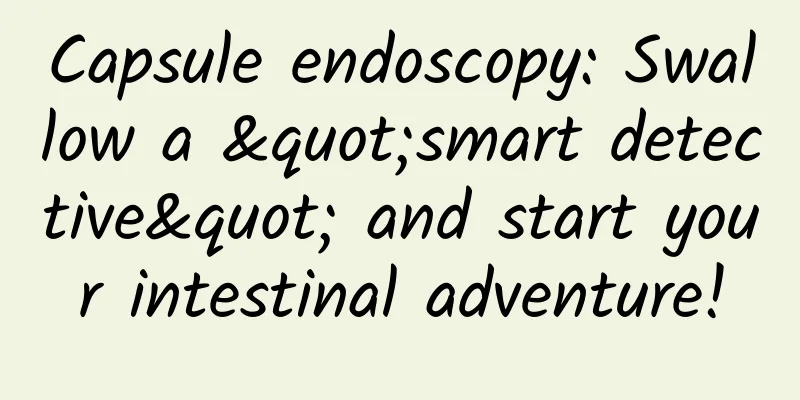Capsule endoscopy: Swallow a "smart detective" and start your intestinal adventure!

|
Author: Liu Bo, The Fifth Medical Center, PLA General Hospital Qi Xiaobao The Fifth Medical Center of PLA General Hospital Reviewer: Lu Zheng, deputy chief physician, Fifth Medical Center, PLA General Hospital Capsule endoscopy is called "the revolution and direction of endoscopy development in the 21st century" by the medical community. Its full name is the intelligent capsule gastrointestinal endoscopy system, also known as medical wireless endoscopy. Its principle is that the subject orally takes a smart capsule with a built-in camera and signal transmission device, which moves in the digestive tract with the help of digestive tract peristalsis and takes images. The doctor uses an external image recorder and imaging workstation to understand the condition of the subject's entire digestive tract, and thus diagnose his or her condition. Figure 1 Copyright image, no permission to reprint The working process of capsule endoscopy is as follows: the patient swallows the capsule with water like taking medicine, and the capsule endoscopy moves along the direction of stomach → duodenum → jejunum and ileum → colon → rectum in accordance with the movement rhythm of the gastrointestinal muscles, while continuously photographing the cavity segments it passes through, and transmitting the images in the form of digital signals to the image recorder carried by the patient outside the body, which stores and records them. The working time is 6 to 8 hours, and the smart capsule will be excreted from the body with feces 8 to 72 hours after entering the human body. The doctor analyzes the images recorded by the image recorder through the imaging workstation to understand the condition of the patient's entire digestive tract and make a diagnosis of the condition. Figure 2 Copyright image, no permission to reprint 1. What are the advantages of capsule endoscopy? Capsule endoscopy is mostly used for the examination of the small intestine. The small intestine, which is 5 to 7 meters long, has long been considered a "blind spot" in clinical examinations. In addition to a major breakthrough in the "blind spot" of the small intestine, the emergence of capsule endoscopy has also made it possible to diagnose gastrointestinal diseases in the early stages. There is an old Chinese saying: "It is better to take precautions before they happen." However, to achieve this in clinical practice, advanced, safe, and comfortable medical devices are also needed. At present, many treatment and examination equipment cannot be painless and non-invasive, and patients will be psychologically afraid and reject them, resulting in some diseases not being discovered in the early stages, or even "discovered in the late stages". Capsule endoscopy is a new, safe and comfortable means of digestive tract examination. It can reduce patients' fear of examinations and make them more acceptable, thus making capsule endoscopy an important application value for the early diagnosis of gastrointestinal diseases. 1. Expand the field of vision: It breaks through the blind spot of small intestine examination and greatly improves the diagnosis and detection rate of digestive tract diseases. 2. Safety and hygiene: The capsule is disposable to avoid cross infection, and the inspection process is painless and non-invasive; its shell is made of medical polymer materials that cannot be corroded by digestive fluid, is non-toxic and non-irritating to the human body, and can be safely excreted from the body. 3. Comfortable and free: patients do not need anesthesia or hospitalization, and their normal work and life will not be affected. Just be careful not to engage in heavy physical labor or strenuous exercise on the day of the examination. 4. Simple operation: The entire examination process only involves three steps: swallowing the capsule, recording and playback observation. During the playback observation process, the doctor can make an accurate judgment on the condition based on the captured images. 2. Do I need to prepare my bowel before capsule endoscopy? What should I pay attention to in my diet? 1. The intestines need to be cleaned before capsule endoscopy. If there is a lot of feces in the intestines, the lesions may be covered, thus affecting the observation effect. Figure 3 Copyright image, no permission to reprint 2. Diet and preoperative preparation considerations (1) Dietary requirements: Starting from 2 days before the examination, follow a diet with little or no residue, such as porridge, bread, noodles, tofu, etc., and avoid vegetables, fruits, dairy products, meat and other foods. (2) If the patient is taking iron supplements, they should stop taking them one week before the examination. Do not take any medications within 2 hours before the examination. (3) Diabetic patients need to adjust the amount of insulin (reduced food intake during the examination). (4) Start eating liquid food one day before the examination and fast 12 hours before the examination. Except for a small amount of water, do not drink other colored beverages such as milk, coffee, etc. (5) Take intestinal cleansing medication orally 12 hours before the examination. (6) Do not smoke 12 hours before the examination. 3. What are the key points of observation after capsule endoscopy? 1. Abdominal pain: If you have severe or persistent abdominal pain, please contact your doctor immediately. 2. Vomiting: If vomiting occurs, contact a doctor immediately. 3. Diet: No restrictions. 4. Activities: Normal activities can be resumed from the second day after surgery. 5. Medication: You can take medications normally. 6. Capsules: Capsules are usually discharged within 72 hours. Occasionally, a delay of 1 to 2 weeks is normal. Please pay attention to observation. There is no need to recycle the discharged capsules. Do not panic if the discharged capsules are still flashing, which is normal. 7. If the capsule is not found to be expelled and there are no symptoms after 2 weeks, an X-ray examination can be performed to confirm whether the capsule has been expelled. |
>>: New blood test method: A sharp eye for identifying Alzheimer's disease
Recommend
Is it too late to have an abortion after 60 days?
If you get pregnant unexpectedly, you can actuall...
Does ani levator exercise help tighten the vagina?
For some women, they have their own unspeakable s...
What to do if your uterus is retroverted during pregnancy
Pregnancy and the birth of a new life is a very h...
What is the difference between a network hard drive and a mobile hard drive? How can a mobile hard drive be connected to an LCD TV?
Everyone who is familiar with Encyclopedia Knowle...
How to deal with the yellowing and falling leaves of gardenias?
Gardenia is very common in life. Many people like...
What causes wrist pain after childbirth?
Some mothers after childbirth will report that th...
One breast always hurts
Breast pain can be unilateral or bilateral. Advan...
Can pregnant women have their hair straightened?
Pregnant women need to consider the health of the...
What are the methods for breast augmentation?
Breast sagging often causes great psychological d...
Is it normal to have abdominal pain before menstruation when pregnant?
Sometimes girls are more careless. Take pregnancy...
I got pregnant without implantation and cooling down
If there are no protective measures after having ...
HootSuite: Social media ad spending to exceed $173 million in 2022
General Social Advertising Statistics Social medi...
Causes of upper body obesity in women
Many women are fat in the upper body, and it is g...
My period can't come. What's going on?
Regular menstruation every month and normal color...
The banned ingredients in diet pills are endangering women's health
The recent "Guo Meimei and others selling to...









